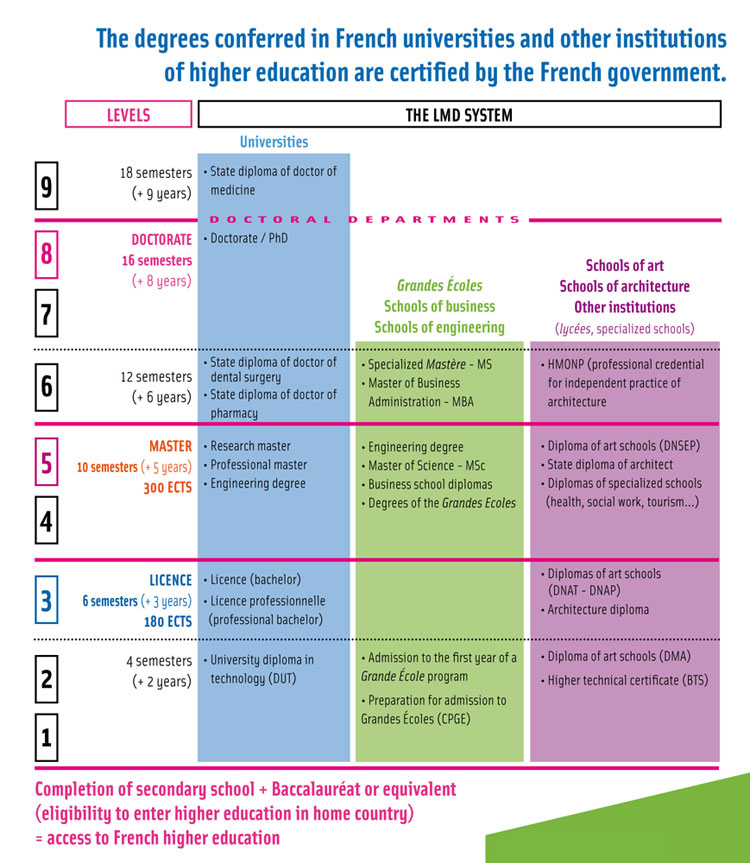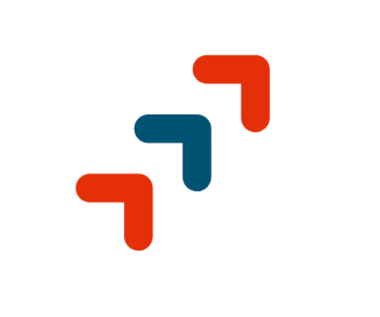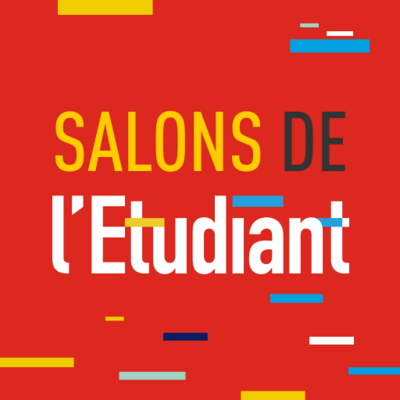Finding your way
Finding your way after the baccalaureate exam is not always easy, whether you are a high school or university student. LyonCampus proposes a list of things to think about for finding the studies that correspond to what you’re looking for!
Choosing your studies in Lyon Metropole
A short or a long course of studies? Multidisciplinary or specialized training? In a university or a private school? Build your post-baccalaureate pathway by choosing training that corresponds to your professional project, your personality, your scholastic ability, etc.
The different types of establishments of higher education
There are several types of establishments of higher education in Lyon Metropole, including universities, grandes écoles and preparatory classes, specialized schools (engineering, business, healthcare, etc.) and technical universities.
On LyonCampus, you’ll find the list of all establishments (french only) and a map of the campuses (french only) in Lyon Metropole.
A public or private establishment?
There are both public and private establishments in France, with a differences in enrollment fees:
Enrollment fees are established by law for public establishments, which are government-supervised and funded and accept scholarship students. These are, most notably, the universities.
Enrollment fees are set individually by private establishments with or without a contract and consular establishments (attached to the CCIs). For this type of establishment, check to see whether your diploma is recognized by the State and whether your training gives you access to CROUS scholarships. This will not necessarily be the case.
The University of Lyon (UDL) is a community of university establishments (COMUE) composed of 12 member establishments and 25 associated establishments, with 140,000 French students, 20,000 foreign students, 6,800 research workers and teacher-researchers and 172 public laboratories.
Various types of training

There are several types of training that correspond to your choice of profession. In Lyon Metropole there is over 1,000 training courses of all types over the area.
Initial training: this is the traditional type of training, where you study “full time”. With this type of training, you have the possibility of doing an internship.
Work-study training: this allows you to be in contact with the world of business, alternating theory and practice. The company you work for also pays your school fees. If you attend a private school, your training will be less expensive.
Remote training: you follow a full program and receive your courses by email or postal mail. You must turn in homework and be physically present at year-end exams.
Online training: dedicated online platforms propose courses to work on for training. You do not receive a diploma, but your skill is recognized. There are also free online courses for gaining greater in-depth knowledge.
Professional training: if you are already working, you can ask your employer for short training courses to develop your skills.
Continuing education: for individuals who are already working and training through their company.
Your Parcoursup choices

Parcoursup is the national website for pre-enrolling in the first year of a higher educational program in France (Licence, BTS, DUT, CPGE, engineering schools, nursing schools, social work institutes, etc.). You will use this platform to consult your file and indicate your educational training choices.
Who is it for?
All high school students, apprentices or students in reorientation who want to sign up for a first year of study in an establishment of higher education.
Students who are repeating a year, international candidates subject to DAP (pre-admission) requests and candidates for continuing education are not concerned by the platform.
Good to know
If you are a high school student and hold a high school scholarship, you may be eligible for a Parcoursup travel scholarship. You may request one-time assistance in the amount of €500 if you accept a choice of school that is outside your area’s district. A “travel” button for requesting a travel scholarship will appear next to your validated choice on the Parcoursup platform.
What for?
Unless the establishments have a special exemption, every first registration into a training program in the Lyon Metropolis has to be made on Parcoursup.
Interactive map of all the training programs available on Parcoursup
Steps to follow for your Parcoursup orientation:
- November to January: find out information on available orientations.
- January to March: create your file and list up to ten desired training programs.
- Early April: validate your wish list and fill in your documents and Avenir files.
- April to May: your applications will be examined by the training programs.
- End May to early July: you will receive proposals from the establishments. The platform is not available during the baccalaureate exam period.
- From May to September: if you have not received a choice, you enter the complementary phase. You will be provided with support from your rectorship to find a training program, and you will have a choice of programs proposed starting at the end of June.
Good to know
After receiving your baccalaureate results and your Parcoursup admission results, the CAES (Commission d’Accès à l’Enseignement Supérieur, or commission for access to higher education) will enable you to find appropriate training if you have not been accepted by a school you asked for. This commission exists in each academic area and is available only after baccalaureate results have been announced.
CAES informations -french (pdf)
CAES informations for exceptional case -french (pdf)
Assistance for building your pathway of studies in Lyon Metropole
Aids from your establishments
If you are still in high school
You have several resources to help you find an orientation:
Among your school’s staff members, your head teacher is the person most familiar with your school activity and results. Feel free to ask him or her for advice on your orientation with respect to the subjects you are best-equipped to handle.
Your school’s CDI (documentation center) can propose a number of brochures to help you make a choice, along with information on various professions, ONISEP information, etc.
The orientation psychologists from your academic area (formerly known as “orientation counselors”) can help you decide on an orientation. You can ask for one or more appointments with the psychologist by contacting the CPE in your establishment.
If you are already a student in higher education
Universities throughout the metropolitan area propose orientation services for their students, with an individualized reception, workshops and support from an orientation psychologist. You can contact them if you have questions about your orientation or if you want to change your course of study:
SOIE at Lyon 1
SCUIO-IP at Lyon 2 Porte des Alpes campus (Bron)
CIDO at Lyon 3
Ucly reorientation mission: mission.orientation(a)univ-catholyon.fr
Orientation Center on the HEP René Cassin campus: orientation(a)campushep-lyon.com
If the school or university you want to attend has an alumnae network, feel free to contact former graduates to get feedback on the training programs you’re interested in.
Local support structures
The Centres d’information et d’orientation (CIOs, or information and orientation centers) are services that are part of the Ministry of National Education. They are open to the public and free of charge. They allow you to consult with orientation professionals on any questions you might have about your higher educational pathway.
Click here for the list of CIOs in the Lyon academic area.
Among the Lyon Métropole welcome, information and orientation entities, the following are also free of charge:
Your nearest local mission and the Maison Lyon pour l’Emploi job center let you meet with counselors, in particular as concerns professionally recognized training, school dropout, etc.
The Centre Régional d’Information Jeunesse (CRIJ), and the youth information offices in the various municipalities of Lyon Métropole.
At the International Information Center – Euroguidance in Lyon for all questions concerning orientation in Europe.
The list of orientation entities in Lyon and the surrounding area
Directory of counsellors for support
Private entities specialized in orientation also propose support services and coaching for a fee: compare rates and opinions on the internet before opting for paid coaching.
Online information: useful links
Orientation by the Rhône-Alpes Region: All regional training programs and assistance for finding an internship or employment.
Infos-Jeunes: Lots of advice on how to choose your orientation.
Les Promeneurs du Net: Counselors for the young are available through the social networks for answering all your questions.
Onisep: Complete information on trades and professions and assistance for finding a profession.
Mon Orientation en Ligne: To contact a counselor directly and free of charge.
Etudiant.gouv: Complete information and guidance for students.
Orientation pour Tous: Advice on training and a list of available training programs.
Info Jeunesse: To learn more about various professions according to your centers of interest.
L’étudiant: A site that is fully devoted to orientation. Be careful, however, some articles may have been sponsored by private schools.
Pôle Emploi: If you have dropped out of school but want to find training or if you want to speak to a counselor about taking up your studies again.
Jobs IRL: A network for direct contact with thousands of professionals and students to have concrete information on professions and job possibilities.
Orientation highlights in Lyon

Numerous events such as shows, forums and open house days are organized throughout the year by Lyon Métropole to help you find an orientation.
Among the highlights:
Salon de l’Étudiant at Eurexpo
Journées de l’Enseignement Supérieur (JES, or higher education days) in establishments of higher education and high schools
Orientation Night at the Lyon Métropole CCI
Studyrama show at Double Mixte
Mondial des Métiers at Eurexpo
Salon de l’apprentissage, de l’alternance et des métiers (show focusing on apprenticeship, work-study and the trades and professions) at Cité Internationale
Masters / Mastères / MBA show at Cité Internationale
For other orientation events, stay connected to the LyonCampus agenda (french only)!
Reorientation
What can you do if you haven’t chosen the right course of studies?
1 – Put things in perspective, you’re not the only one! Nearly 70% of student enrolled in the first year of university studies change to another program or discontinue their studies.
2 – As soon as possible, contact your establishment’s orientation service, if there is one, or a person responsible for learning. There are several ways to reorient yourself without losing your school year.
If you have validated your first semester of LI and want to change your training program:
Certain establishments of higher education will provide:
Internal bridges to go directly to a second semester in another L1 training program or establishment
External bridges to certain technical universities or direct entrance into the second semester
Certain specific bridges to selective training programs (PACES healthcare studies, law, etc.), sometimes according to grades received during the year.
“Discovery” semesters to get acquainted with other subjects and training courses during a semester, while maintaining your study habits.
Examples:
- the university reorientation semester at University Lyon 1
- the “rebound semester” at University Lyon 2
“Reorientation” events organized during the first semester
Contact your orientation service to learn about the possibilities in your establishment
If you do not wish to continue your school year:
You can still involve yourself in projects that you can list on your résumé and stay active. Here, you will find information on the VIE/VIA program, civil service and student jobs.
Attention !
Note that if you are a CROUS scholarship student, you must reimburse the amounts received if you discontinue your studies during the year. You can keep your scholarship if this is the first time you repeat or if you do a different L1 (one time only).

